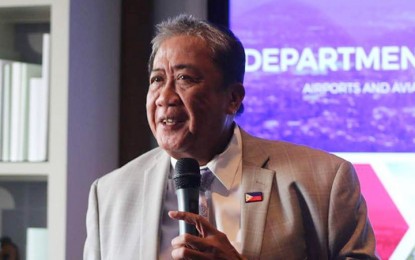
CLARK, PAMPANGA – Advancing air connectivity throughout the country and with the world, the Duterte administration, through the Department of Transportation (DOTr) Aviation and Airports Sector and the Civil Aviation Authority of the Philippines (CAAP), has completed 17 commercial airport projects, with 28 more ongoing, in the first half of President Rodrigo Roa Duterte’s term.
DOTr Secretary Arthur Tugade highlighted the vital importance of air connectivity in regional development.
“Connectivity and mobility in transport are key components in socio-economic development. By building new airports and rehabilitating existing ones, the transportation sector contributes to both regional and national progress,” Tugade said.
During the first half of Duterte’s term, two new international airports have been built -- the Lal-Lo International Airport in Cagayan, and the country’s first eco-airport, the Bohol-Panglao International Airport.
Fifteen other existing gateways have also been upgraded, two of which are international and 13 domestic.
Under rehabilitated international airports, Tugade said the Mactan-Cebu International Airport (MCIA), hailed as the world’s friendliest resort airport, opened its new Passenger Terminal Building (PTB) last year, boosting the annual capacity to 13.5 million passengers.
The Puerto Princesa Airport’s PTB was also expanded, and its runway extended to accommodate larger aircraft.
On July 5, Ormoc Airport’s new facilities, including a renovated PTB and a widened runway, were inaugurated by no less than President Duterte himself.
Additionally, infrastructure developments for the domestic airports of Virac, Marinduque, Tuguegarao, San Vicente, and Busuanga in Luzon; Maasin, Tacloban, and Catarman in the Visayas; and Ipil, Camiguin, and Siargao in Mindanao, have been accomplished.
New, upgraded airport projects to come
Testament to the government’s continuing drive for air connectivity, the DOTr-CAAP is accelerating the ongoing infrastructure development in 27 commercial airports and one military air base. The government is also set to build one more international airport.
The Ninoy Aquino International Airport (NAIA), the country’s main gateway, continues the rehabilitation works for its Terminal 2. These include the expansion of departure check-in hall and arrival baggage area; architectural improvements in passenger movement areas; upgrade of aerobridge areas and elevated roadway; new glass wall panels and partitions; upgrade of air-conditioning system, power, lightings, fire protection, and electronics and communications systems; installation of an improved flight information display system and a new public address system; and waterproofing works for building exterior, among others.
As the NAIA rehabilitation continues, the government is also working to decongest the main gateway through complementary infrastructure development.
Additional facilities at the Sangley airport in Cavite are now under 24/7 construction to meet the November 2019 deadline of the President for the military air base to commence general aviation and turboprop operations.
Construction is also ongoing for the second PTB of the Clark International Airport (CRK). The expansion is seen to increase the CRK’s overall capacity to 12.2 million passengers annually. An additional runway is also set for construction.
To further aid in the long-term decongestion of NAIA, plans are underway for the proposed New Manila International Airport in Bulacan. Opening of bids is on 31 July 2019.
Meanwhile, the Bicol International Airport is now more than halfway complete. The airport is expected to accommodate two million passengers per year, and is targeted for completion in 2020.
International airports in Davao, General Santos, Zamboanga, Iloilo, Kalibo, and Laoag are also undergoing improvements.
Development projects continue, as well, for domestic airports in Busuanga, Cauayan, Naga, and Tuguegarao in Luzon; Bacolod-Silay, Calbayog, Catbalogan, Dumaguete, and Tacloban in the Visayas; and Bukidnon, Ipil, Laguinduingan, Mati, M’lang, Ozamiz, Sanga-Sanga, Siargao, and Surigao in Mindanao.
CAAP Director General Jim Sydiongco said the public can expect more airport development projects and programs to be completed in the remainder of Duterte’s term.
“A number of airports we have rehabilitated were in a dismal state when we took over. We are proud of what we have already accomplished, but we know that we can do more. With the guidance of our hardworking Secretary Tugade, we will continue to build, build, build towards the ‘Golden Age of Infrastructure’,” Sydiongco said.
Aside from developing the nation’s airports, major programs and initiatives have been launched to further uplift aviation and airports services, such as the establishment of new Communications, Navigation, Surveillance/Air Traffic Management System that now covers 100 percent of Philippine airspace, and the night-rating of 15 more commercial airports to further ease decongestion in major gateways. (PR)
